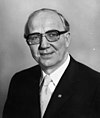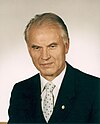
Hans Modrow was a German politician best known as the last communist premier of East Germany.

The Christian Democratic Union of Germany was an East German political party founded in 1945. It was part of the National Front with the Socialist Unity Party of Germany (SED) and a bloc party until 1989.
Articles related to East Germany include:

Manfred Gerlach was a German jurist and politician, and the longtime leader of the East German Liberal Democratic Party. He served as Chairman of the Council of State and was thus head of state of East Germany from 6 December 1989 to 5 April 1990.
The German Democratic Republic was created as a socialist republic on 7 October 1949 and began to institute a government based on the government of the Soviet Union during the Stalin era. The equivalent of the Communist Party in East Germany was the Sozialistische Einheitspartei Deutschlands, which along with other parties, was part of the National Front of Democratic Germany. It was created in 1946 through the merger of the Communist Party of Germany (KPD) and the Social Democratic Party of Germany (SPD) in the Soviet Occupation Zone of Germany. Following German reunification, the SED was renamed the Party of Democratic Socialism (PDS), which eventually merged with the West German Electoral Alternative for Labor and Social Justice to form the modern Left Party.

The Order of Karl Marx was the most important order in the German Democratic Republic (GDR). The award of the order also included a prize of 20,000 East German marks.

Athletes from East Germany and West Germany competed together as the United Team of Germany for the last time at the 1964 Summer Olympics in Tokyo, Japan. 337 competitors, 275 men and 62 women, took part in 159 events in 19 sports.

The Social Democratic Party in the GDR was a reconstituted Social Democratic Party existing during the final phase of East Germany. Slightly less than a year after its creation it merged with its West German counterpart ahead of German reunification.

The National Defense Council of the German Democratic Republic was created in 1960 as the supreme state body of the German Democratic Republic in charge of national defense matters, including mobilization planning. The NVR held the supreme command of the GDR's armed forces, and the NVR's chairman was considered the GDR's commander-in-chief.

General elections were held in East Germany on 18 March 1990. They were the first free elections in that part of Germany since 1932, and were the first and only free elections held in the state before German reunification. The Alliance for Germany, led by the new East German branch of the centre-right Christian Democratic Union (CDU), won 192 seats and emerged as the largest bloc in the 400-seat Volkskammer, having run on a platform of speedy reunification with West Germany. The East German branch of the Social Democratic Party (SPD), which had been forced to merge with the Communist Party of Germany (KPD) in 1946 and refounded only six months before the elections, finished second with 88 seats despite being widely expected to win. The former Socialist Unity Party of Germany, restyled as the Party of Democratic Socialism (PDS), finished third with 66 seats.

Gerhard Beil was a politician for the SED and the Minister for Foreign Trade of the GDR.

Kurt Wünsche was a German politician who was twice Minister of Justice of the German Democratic Republic.
Peter Moreth was a German politician of the East German satellite party LDPD. He was a member of the Volkskammer from 1986 to March 1990 and member of the State Council of East Germany from 1986 to November 1989. During the Peaceful Revolution he was a Deputy Chairman of the East German Council of Ministers from November 1989 to March 1990, overseeing local government. During the transition towards German reunification he was briefly the first president of the Treuhand, the organisation entrusted with the privatisation of East Germany's nationally-owned enterprises.

Hans-Joachim Heusinger was a German politician and party functionary of the Liberal Democratic Party of Germany (LDPD).


















